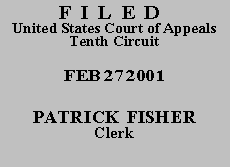

| DONNA SUE WICKER,
Plaintiff-Appellant, v. KENNETH S. APFEL, Commissioner, Social Security Administration, Defendant-Appellee. |
|
Claimant Donna S. Wicker appeals an order of the district court, affirming the decision of the Commissioner of the Social Security Administration, denying her applications for disability and supplemental income benefits. Claimant first applied for social security benefits on August 8, 1994, alleging disability as of June 7, 1993, due to back pain. Her applications were denied administratively and upon reconsideration. After a hearing before an administrative law judge (ALJ), the agency again denied benefits. The Appeals Council denied review. Claimant then filed suit in district court and consented to proceed before a magistrate judge pursuant to 28 U.S.C. § 636(c). The magistrate judge affirmed the ALJ's decision denying benefits, and this appeal followed.
We have jurisdiction over this appeal by virtue of 42 U.S.C. § 405(g). Our review of the agency's decision is limited to determining whether the decision is supported by substantial evidence, and whether the Commissioner applied correct legal standards. Castellano v. Secretary of Health & Human Servs., 26 F.3d 1027, 1028 (10th Cir. 1994). We may neither reweigh the evidence nor substitute our discretion for that of the agency. Casias v. Secretary of Health & Human Servs., 933 F.2d 799, 800 (10th Cir. 1991). In light of these standards, and after a thorough review of the record, we affirm.
In order to determine whether a claimant is disabled within the meaning of the Social Security Act, the agency applies a five-step process. See Williams v. Bowen, 844 F.2d 748, 750-52 (10th Cir. 1988) (discussing five steps in detail). If a claimant is determined to be disabled or not disabled at any step, the evaluation process ends there. Id. at 750. Here, the ALJ determined that claimant had a residual functional capacity (RFC) for a full range of sedentary work despite her severe impairment of back pain, and therefore that she could return to her past relevant work as a collection clerk.
On appeal, claimant contends that the ALJ failed to take into consideration evidence favorable to her in making his RFC determination and in discounting her credibility. She contends that the ALJ failed to discuss or consider her allegations of migraine headaches, osteoarthritis, gallbladder problems, pancreatitis and accompanying abdominal pain, high blood pressure, high cholesterol, and other symptoms. She asserts that the ALJ selectively quoted from the medical evidence, mischaracterized the medical evidence, and ignored certain evidence. She contends that the Appeals Council failed to take her new medical evidence into consideration in conjunction with her previous evidence and the ALJ's decision.
Our review of the ALJ's decision and the Appeals Council's denial of review in light of the complete medical record and applicable law convinces us that substantial evidence supports both the ALJ's RFC determination and his conclusion that claimant's testimony at the hearing was less than fully credible. The ALJ considered all of the medical evidence available to him and applied the correct standards. The evidence before the Appeals Council supports its denial of further review. Claimant's arguments essentially seek a reweighing of the evidence before the agency, which this court cannot do. See Hamilton v. Secretary of Health & Human Servs., 961 F.2d 1495, 1498 (10th Cir. 1992). The judgment of the United States District Court for the Northern District of Oklahoma is AFFIRMED.
Entered for the Court
Circuit Judge
*. This order and judgment is not binding precedent, except under the doctrines of law of the case, res judicata, and collateral estoppel. The court generally disfavors the citation of orders and judgments; nevertheless, an order and judgment may be cited under the terms and conditions of 10th Cir. R. 36.3.